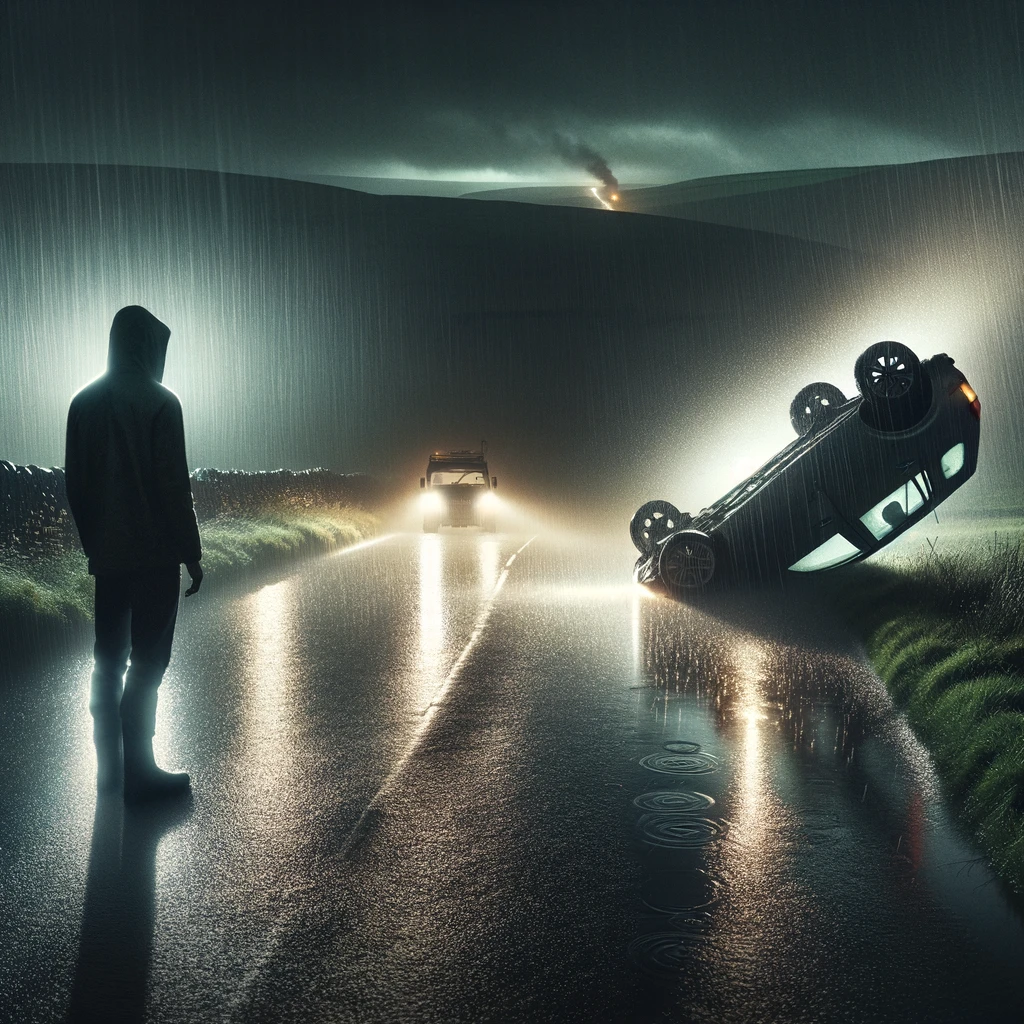Driving through a storm in the dark, in a remote part of the Yorkshire Dales last week, I passed a car which was upside down on the side of the road. Having attended a party, I was wearing my best party clothes.
I pulled in, just 150m away, and ran to the car – something I haven’t done in three years since my health declined – in the knowledge that I was likely to find fatalities.
I know a thing or two about car accidents, having been first on the scene at a number of serious accidents and having represented hundreds of people who have been injured in RTAs.
As I ran, in the pouring rain and buttressed by the sideways wind, another vehicle stopped, next to the upside-down white Citroen. Arriving on scene, two people – a young man and a woman, presumably boyfriend and girlfriend – had clambered out. They were dazed but appeared physically unharmed.
Standing in a rushing torrent of water, in my best suede shoes, I used my mobile-phone light to look for bodies in the car and the surrounding area. Another driver – a third car – stopped and he gave me a torch from which I could look into the car. I checked for sparks, but mercifully there were none.
Another car stopped – now a fourth vehicle – this time with an off-duty fireman, who offered help.
I put the two passengers into the nearby vehicle and checked them both for cuts and fractures. The man’s chunky watch had lacerated his left wrist, but he wasn’t going to bleed out. The girl was traumatised, but physically she seemed ok. With the police now en route, I left my number and walked back to my car, shining my mobile-phone light at passing cars to ensure that I wasn’t mowed down.
Back in my car, my autonomic nervous system ran amok.
These last few years, this automatic bodily operating system of mine has been defective; a condition known as dysautonomia. Essentially my flight or flight response has been damaged by antibiotics. The damage is permanent, though its impact on my life is erratic. When I decided to help, I knew that it would take me some days, perhaps weeks, for my neurological system to return to its new homeostasis. But it was worth it. I felt good. But I had to sit in my car, soaked, whilst my heart rate reduced.
Driving home, my heart racing, though slowing, I was warmed by the evidence that human-beings are good: that lots of people risked injury, both mental and physical, and damage to clothes, not to mention a waste of their time, to help people who, for all we knew, had been speeding in a stolen car in a storm. As I always tell my children, 99% of people are good. Now I have a cast-iron example to prove my case.
One week later, my autonomic nervous system remains triggered; each passing day brings greater calm.
…………………………………………….
As a philosophy obsessive, many years ago I was introduced to the work of Australian philosopher, Peter Singer. In his work Famine, Affluence, and Morality, Singer posited this simple thought experiment.
Imagine that you are walking alone through a village. Nobody else is around. Walking near to the village pond you see that a toddler is drowning. You are wearing your best clothes. You know that you could easily save the child, but in doing so you will ruin your clothes, costing, say, £80. Would you – should you – save the child?
To which everyone – literally everyone I have ever posed this to – says that they would.
To which Singer then argues, that people who have their basic needs met – shelter, food, warmth, healthcare – shouldn’t spend their money on luxuries, such as takeaway coffee, or expensive clothes, when they know that they could donate this money to organisations, such as Save The Children in order prevent a child, or children, from starvation.
Singer challenges us to consider: what is the difference between wading into the mud to save a child within our sight, incurring minor personal expense, and donating money we might otherwise spend on luxuries to save unseen children?
I do not have an answer and having posed this questions dozens of times to friends and family, I am yet to hear a convincing answer as to why we do not all do this.
Re-examining Singer’s work this week, of all weeks, I am hit – as I was the first time I heard this experiment – with the knowledge that I am evil. Sure, I donate money and my time to good causes, and I stop at road traffic accidents, but I live a life of material abundance. I could do more, but I don’t, and I cannot avail myself of the defence of ignorance.
I wonder how future generations will judge me.










